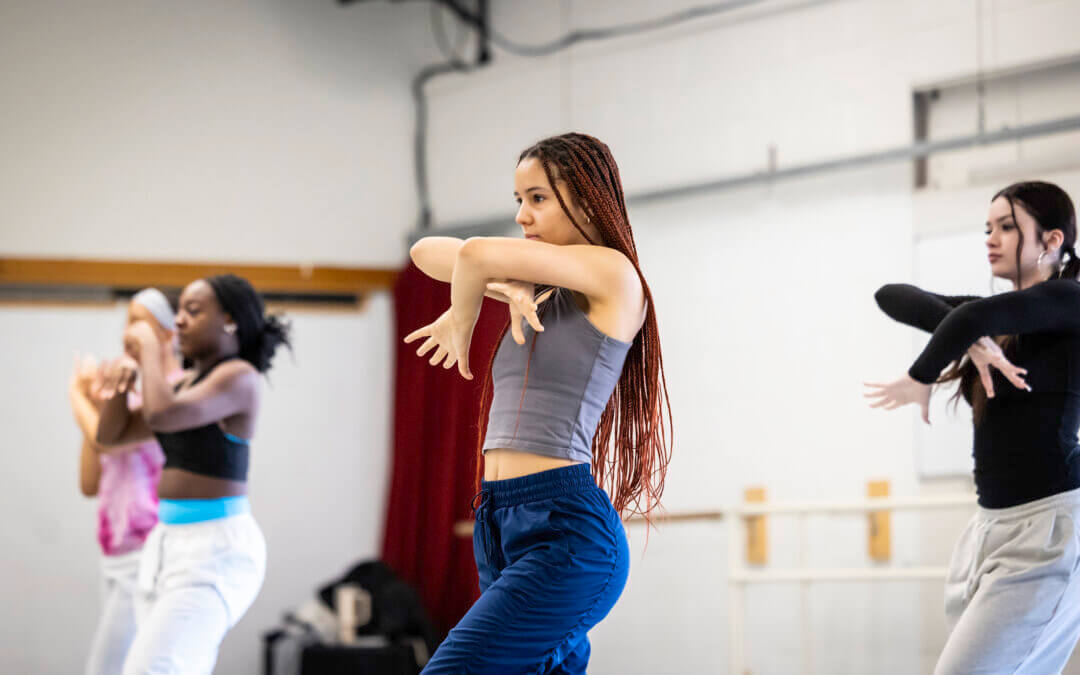
Students dance in José Lapaz-Rodriguez’s class “Special Topics: House” (Photography by Lynne DeLade)
This spring, MGSA faculty gave us the inside scoop on the courses they’re teaching—from street style dance classes to closet-flipping DIY workshops, we’re highlighting one registration-worthy class from each department.
Theater
 What it’s called: “Upcycling: An Artistic Response to the Environmental Effects of Fast Fashion”
What it’s called: “Upcycling: An Artistic Response to the Environmental Effects of Fast Fashion”
Who can take it: The course is an elective under the Creative Expression and the Environment minor but is open to all Rutgers students.
What it’s all about: Every day is Earth Day in this hands-on course! Taught by Costume Director Denise Wagner, students learn to turn discarded garments into sustainably stylish one-of-a-kind pieces. From natural resist dyeing to Japanese-style mending, students practice a variety of skills for clothing repair and embellishment, while incorporating readings and screenings covering the economic, environmental, and humanitarian impact of the textile industry.
“The more we use what we already have, the more it stays out of a landfill,” Wagner says. “The less we buy, the less ends up there.”
Wagner, now in her second year of teaching the course, hopes students end the semester with a broader understanding of where their clothing comes from, and the effect fast fashion can have on people and the planet. Read more about the course in Rutgers Today!
Art & Design
What it’s called: “Drawing 2B, Graphic Novel”
Who can take it: Art & Design students who have taken “Drawing Fundamentals” and “Drawing I-A” and are concurrently taking “Drawing I-B: Systems and Mapping”
What it’s all about: Joshua Bayer’s “Drawing 2B, Graphic Novel” may seem like an usual combination of ideas—an assignment on “ambiguity,” then a lesson on the work of William Blake, then a few days dedicated to recalling an injury—but for Bayer, it’s all part of the creative process. The goal of the class, he says, is to “provide students with the missing link that ties together research, memory, imagination and reference.”
Throughout the course of the semester, students explore a variety of artistic influences, learning different methods for capturing mood or emotion, and are challenged with “visualization assignments,” where the goal is to turn something intangible—a memory, a feeling, or, as one assignment revolves around, a void—into something tangible through illustration.
Dance
 What it’s called: “Special Topics: House”
What it’s called: “Special Topics: House”
Who can take it: MGSA Dance majors
What it’s all about: Turn up the music! This special topics course invites dancers into the world of ballroom—a highly stylized genre of dance developed by Harlem’s Black and Latino LGBTQ+ community in the 1980s.
Course instructor and BFA Dance alum José Lapaz-Rodriguez guides students through the basics, first practicing foundational movements, then adding on embellishments and flourishes. Lapaz-Rodriguez focuses on two styles of dance during the semester: “Vogue Fem,” which includes moves like the catwalk and the duck walk, and “New Vogue,” which emphasizes flexibility and precision. Classes recreate the loud, lively setting of a “ball,” with students practicing across the floor combinations while uptempo club beats are cranked high, punctuated by crash cymbals and lyrical overlays.
“These street styles are grounded in telling a story,” Lapaz-Rodriguez says. “[They’re about] bringing one’s true personality and soul to the dance.”
Music
What it’s called: “The Art of Production 1: Recording”
Who can take it: MGSA Music majors who have taken “Making Music With Computers: Introduction to Digital Audio” or “Introduction to Music Technology” or “Making Music with Computers: Introduction to Digital Audio Online”
What it’s all about: Lecturer Gregg Rossetti knows that behind every great song, there has to be great production. In “The Art of Production 1: Recording,” students take it from the top, starting with the basic properties of sound and hearing. Later in the semester, students try their hand at recording with analogue and digital equipment. Along the way, they’re investigating the unexpected complexities of capturing sound—a foundational skill for creating all kinds of music.
Rossetti brings experience in composition, sound design, and audio engine design to the course, which he teaches alongside other Music Technology classes like “Making Music with Computers” and “Intro to Music Technology.” He also serves as faculty advisor to the Rutgers University Club for Video Game Music. The club, which is open to all Rutgers students, has performed tracks from “Overcooked 2,” “Donkey Kong Country,” and “The Legend of Zelda.” Check out The Daily Targum’s review of their last concert here!
Filmmaking
 What it’s called: “Horror Film Production”
What it’s called: “Horror Film Production”
Who can take it: MGSA Filmmaking majors
What it’s all about: “Engaging with horror films is like a rite of passage, between being young and being an adult,” says Film professor Caroline Key. In her class, “Horror Film Production,” Key encourages students to look beyond the spooky surface of films like Halloween and Texas Chainsaw Massacre, and delve into horror not only as a film genre, but as a visceral experience.
While the syllabus includes a handful of cult classics, John Waters’ ultra-camp Pink Flamingos also makes the list, alongside footage of artist and MGSA alum Pope L.’s “crawls” through New York City, a series of provocative performances that interrogate our perception of race and social norms. Students produce a piece of creative writing, a non-narrative “horror” short film, and a final film, based on the material they’ve studied. Throughout the course of the semester, Key and the students investigate two central questions: “What is the world telling us to fear? And what does that mean?”
Read more about “Horror Film Production” here.
View your department’s full course catalogue: Art & Design, Dance, Filmmaking, Music, Theater

